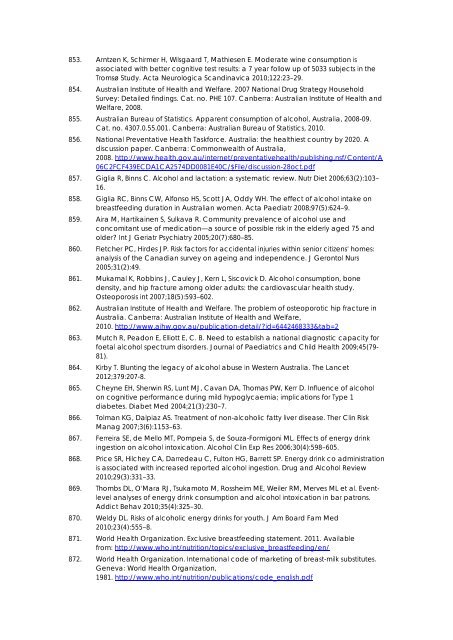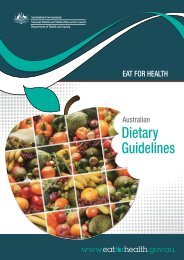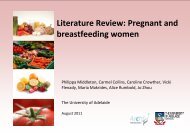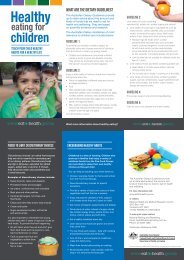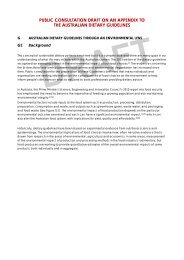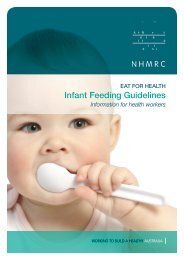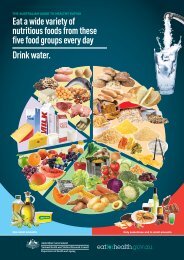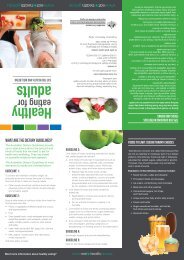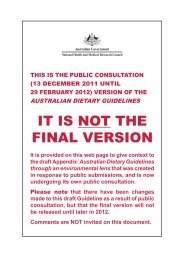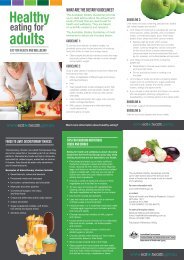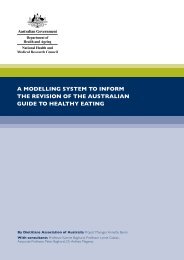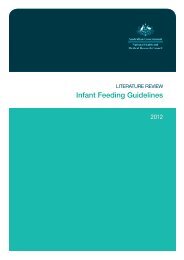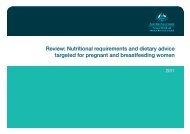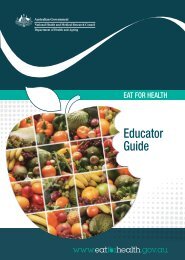Full Reference List (PDF, 451KB) - Eat For Health
Full Reference List (PDF, 451KB) - Eat For Health
Full Reference List (PDF, 451KB) - Eat For Health
Create successful ePaper yourself
Turn your PDF publications into a flip-book with our unique Google optimized e-Paper software.
853. Arntzen K, Schirmer H, Wilsgaard T, Mathiesen E. Moderate wine consumption is<br />
associated with better cognitive test results: a 7 year follow up of 5033 subjects in the<br />
Tromsø Study. Acta Neurologica Scandinavica 2010;122:23–29.<br />
854. Australian Institute of <strong>Health</strong> and Welfare. 2007 National Drug Strategy Household<br />
Survey: Detailed findings. Cat. no. PHE 107. Canberra: Australian Institute of <strong>Health</strong> and<br />
Welfare, 2008.<br />
855. Australian Bureau of Statistics. Apparent consumption of alcohol, Australia, 2008-09.<br />
Cat. no. 4307.0.55.001. Canberra: Australian Bureau of Statistics, 2010.<br />
856. National Preventative <strong>Health</strong> Taskforce. Australia: the healthiest country by 2020. A<br />
discussion paper. Canberra: Commonwealth of Australia,<br />
2008. http://www.health.gov.au/internet/preventativehealth/publishing.nsf/Content/A<br />
06C2FCF439ECDA1CA2574DD0081E40C/$File/discussion-28oct.pdf<br />
857. Giglia R, Binns C. Alcohol and lactation: a systematic review. Nutr Diet 2006;63(2):103–<br />
16.<br />
858. Giglia RC, Binns CW, Alfonso HS, Scott JA, Oddy WH. The effect of alcohol intake on<br />
breastfeeding duration in Australian women. Acta Paediatr 2008;97(5):624–9.<br />
859. Aira M, Hartikainen S, Sulkava R. Community prevalence of alcohol use and<br />
concomitant use of medication—a source of possible risk in the elderly aged 75 and<br />
older Int J Geriatr Psychiatry 2005;20(7):680–85.<br />
860. Fletcher PC, Hirdes JP. Risk factors for accidental injuries within senior citizens' homes:<br />
analysis of the Canadian survey on ageing and independence. J Gerontol Nurs<br />
2005;31(2):49.<br />
861. Mukamal K, Robbins J, Cauley J, Kern L, Siscovick D. Alcohol consumption, bone<br />
density, and hip fracture among older adults: the cardiovascular health study.<br />
Osteoporosis int 2007;18(5):593–602.<br />
862. Australian Institute of <strong>Health</strong> and Welfare. The problem of osteoporotic hip fracture in<br />
Australia. Canberra: Australian Institute of <strong>Health</strong> and Welfare,<br />
2010. http://www.aihw.gov.au/publication-detail/id=6442468333&tab=2<br />
863. Mutch R, Peadon E, Elliott E, C. B. Need to establish a national diagnostic capacity for<br />
foetal alcohol spectrum disorders. Journal of Paediatrics and Child <strong>Health</strong> 2009;45(79-<br />
81).<br />
864. Kirby T. Blunting the legacy of alcohol abuse in Western Australia. The Lancet<br />
2012;379:207-8.<br />
865. Cheyne EH, Sherwin RS, Lunt MJ, Cavan DA, Thomas PW, Kerr D. Influence of alcohol<br />
on cognitive performance during mild hypoglycaemia; implications for Type 1<br />
diabetes. Diabet Med 2004;21(3):230–7.<br />
866. Tolman KG, Dalpiaz AS. Treatment of non-alcoholic fatty liver disease. Ther Clin Risk<br />
Manag 2007;3(6):1153–63.<br />
867. Ferreira SE, de Mello MT, Pompeia S, de Souza-<strong>For</strong>migoni ML. Effects of energy drink<br />
ingestion on alcohol intoxication. Alcohol Clin Exp Res 2006;30(4):598–605.<br />
868. Price SR, Hilchey CA, Darredeau C, Fulton HG, Barrett SP. Energy drink co administration<br />
is associated with increased reported alcohol ingestion. Drug and Alcohol Review<br />
2010;29(3):331–33.<br />
869. Thombs DL, O'Mara RJ, Tsukamoto M, Rossheim ME, Weiler RM, Merves ML et al. Eventlevel<br />
analyses of energy drink consumption and alcohol intoxication in bar patrons.<br />
Addict Behav 2010;35(4):325–30.<br />
870. Weldy DL. Risks of alcoholic energy drinks for youth. J Am Board Fam Med<br />
2010;23(4):555–8.<br />
871. World <strong>Health</strong> Organization. Exclusive breastfeeding statement. 2011. Available<br />
from: http://www.who.int/nutrition/topics/exclusive_breastfeeding/en/<br />
872. World <strong>Health</strong> Organization. International code of marketing of breast-milk substitutes.<br />
Geneva: World <strong>Health</strong> Organization,<br />
1981. http://www.who.int/nutrition/publications/code_english.pdf


